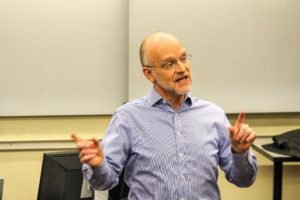This post was written by Meryl Schneider ’19. The Sustainable Innovation MBA features various Innovators-in-Residence over the academic year.
 According to Innovator-in-Residence Dave Stangis, Chief Sustainability Officer at Campbell Soup Company, organizations go through phases when implementing sustainable practices which he called “Sustainability 1.0, 2.0, and 3.0.” Beginning his career at Intel as an Environmental, Health and Safety External Affairs Manager, Stangis’s initial role transformed into Director of Corporate Sustainability where he spearheaded corporate social responsibility and sustainability strategies in response to growing societal concerns of Intel’s environmental, social and economic impact. From there, Stangis’s growing passion for business and sustainability landed him a job at Campbell’s, where he has developed and led the firm’s widely known CSR, ESG and sustainability strategies.
According to Innovator-in-Residence Dave Stangis, Chief Sustainability Officer at Campbell Soup Company, organizations go through phases when implementing sustainable practices which he called “Sustainability 1.0, 2.0, and 3.0.” Beginning his career at Intel as an Environmental, Health and Safety External Affairs Manager, Stangis’s initial role transformed into Director of Corporate Sustainability where he spearheaded corporate social responsibility and sustainability strategies in response to growing societal concerns of Intel’s environmental, social and economic impact. From there, Stangis’s growing passion for business and sustainability landed him a job at Campbell’s, where he has developed and led the firm’s widely known CSR, ESG and sustainability strategies.
Stangis explained the three evolutions of sustainability, beginning with phase one, where most companies find themselves today. In this initial phase, companies focus on reducing costs through eco-efficiencies, risk reduction, and strive to do less harm via environmental stewardship. In phase two, sustainable corporate strategy is respected but can be siloed from the strategy team. Organizations adopt triple bottom line (financial, social, environmental) considerations when evaluating their performance to create greater business value. Phase three sounded like the “ah hah” moment where firms make strategic sustainable business decisions that are imbedded in business strategy and anticipate sustainability challenges instead of reacting to them. Businesses strive to challenge their model in 3.0 with objectives to solve complex social, economic and environmental problems as a product of the business itself.
How does Sustainability 3.0 impact Campbell’s and the food industry? For Stangis and Campbell’s, he is undoubtedly striving to be a Sustainability 3.0 company as a major player in the food industry. Stangis argued that ethical and environmental considerations no longer “just” feed into the Campbell’s strategy but are becoming the company’s strategy. As he put it, the potential challenges the food industry is facing are daunting. Climate change is affecting global food systems while the world population is growing at an accelerated rate. Stangis painted the picture for the future of food and how Campbell’s will ultimately predict, adapt, and strategize their business model into evolving into a 3.0 firm. He explained that by utilizing technology, finding long-term resiliency in regenerative agriculture, and by aligning business objectives with the United Nations Sustainable development goals, a company like Campbells will continue to evolve and innovate as the competition for resources intensifies. Stangis embraces the unknown and ultimately understands that disruptive forces are looming. It is how companies choose to react and grow sustainably from the disruption that will count.

 Reed got his start in advocacy and grassroots work in Michigan. He discussed the evolution of his thinking from an “us versus them” mentality (environmentalists versus business) to understanding business’s role in society (and the part that sustainability-minded professionals can play).
Reed got his start in advocacy and grassroots work in Michigan. He discussed the evolution of his thinking from an “us versus them” mentality (environmentalists versus business) to understanding business’s role in society (and the part that sustainability-minded professionals can play).
 “Connectivity is productivity,” a mantra which has guided entrepreneur Iqbal Quadir to put cell phones in the hands of over 100 million Bangladeshi people. A country once thought to be synonymous with poverty is now seeing unprecedented economic growth due, in part, to the success of Iqbal Quadir and his venture, Grameen Phone, a micro-loan based company which allows those at the base of the pyramid access to modern communication. Iqbal, who is a SEMBA advisory board member, visited the SEMBA class as part of the Entrepreneur in Residence series. He proved to be a model of the disruptive and visionary values that SEMBA represents. He demonstrated that capital is not the source of innovation and development; rather, development is the source for capital.
“Connectivity is productivity,” a mantra which has guided entrepreneur Iqbal Quadir to put cell phones in the hands of over 100 million Bangladeshi people. A country once thought to be synonymous with poverty is now seeing unprecedented economic growth due, in part, to the success of Iqbal Quadir and his venture, Grameen Phone, a micro-loan based company which allows those at the base of the pyramid access to modern communication. Iqbal, who is a SEMBA advisory board member, visited the SEMBA class as part of the Entrepreneur in Residence series. He proved to be a model of the disruptive and visionary values that SEMBA represents. He demonstrated that capital is not the source of innovation and development; rather, development is the source for capital.

